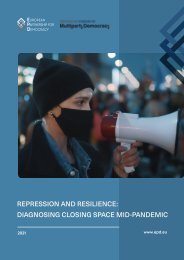Thinking Democratically: A Comprehensive Approach to Countering and Preventing Shrinking Space
Create successful ePaper yourself
Turn your PDF publications into a flip-book with our unique Google optimized e-Paper software.
in line with the findings from Lührmann <strong>and</strong> Lindberg (2019), who identified that over two thirds of<br />
the au<strong>to</strong>cratisation episodes within the current wave of au<strong>to</strong>cratisation are led by state ac<strong>to</strong>rs who<br />
came <strong>to</strong> power legally <strong>and</strong> were mostly democratically elected. 75 While this is not new information,<br />
this poses a dilemma for donors. When is the legally elected government trespassing democratic<br />
norms? Donors continue <strong>to</strong> work with executive governments in their trade <strong>and</strong> development<br />
cooperation, including in decisions on their civil society support. As discussed above, this has led <strong>to</strong><br />
a decrease in support <strong>to</strong> advocacy projects <strong>and</strong> generally went h<strong>and</strong> in h<strong>and</strong> with a reduction in<br />
funding for civil society. In the face of shrinking space, this is very counter-productive.<br />
What is remarkable is that major opposition parties are at times also guilty of changing the rules of<br />
the game <strong>to</strong> restrict political contestation. Political parties’ dual role in both actively restricting<br />
space for contestation <strong>and</strong> passively keeping in place an uneven playing field is striking, considering<br />
the incentives – at least for opposition parties – <strong>to</strong> maintain sufficient room for competition. The case<br />
studies blame a lack of internal democracy in political parties, the role of private <strong>and</strong> illicit funding<br />
in campaigns, <strong>and</strong> winner-takes-all-elections for this. In the face of political parties’ often ambiguous<br />
role, citizens have resorted <strong>to</strong> alternative participation mechanisms in some of the cases under<br />
review, including social movements <strong>and</strong> civic assemblies.<br />
Two other groups of ac<strong>to</strong>rs actively shrinking democratic space are business elites <strong>and</strong> criminal<br />
networks. Through financial support <strong>to</strong> political parties, they skew the political playing field <strong>and</strong><br />
undermine accountability <strong>and</strong> representation. Criminal networks present a particularly challenging<br />
threat <strong>to</strong> democratic space, as they generally foster impunity <strong>and</strong> undermine the judicial branch of<br />
government, which sets the scene for unconstitutional changes <strong>to</strong> the rules for political contestation<br />
<strong>and</strong> the exercise of civil liberties. Donors may, on the other h<strong>and</strong>, consider how <strong>to</strong> leverage their<br />
trade relations for fostering more transparency in businesses’ role in financing <strong>and</strong> interfering with<br />
political processes.<br />
B. Civil society, media <strong>and</strong> smaller opposition parties on the frontline<br />
Interestingly, all cases show that restrictive measures were placed on civil society. This is not<br />
surprising, as all case studies are testament <strong>to</strong> the resilience <strong>and</strong> ingenuity of civil society in<br />
defending <strong>and</strong> exp<strong>and</strong>ing democratic space. In many cases, civil society was able <strong>to</strong> push back on<br />
shrinking strategies through advocacy, public litigation, demonstrations, <strong>and</strong> building strategic<br />
alliances. In other cases, civil society even gained ground by pushing for laws <strong>to</strong> improve media<br />
pluralism (Georgia) or provide budgetary support <strong>to</strong> human rights defenders (Honduras) for instance.<br />
More generally, civil society <strong>and</strong> journalists played an essential role in bringing <strong>to</strong> light cases of<br />
corruption <strong>and</strong> holding the government accountable for upholding the rule of law, especially in<br />
contexts of systematic impunity.<br />
75<br />
Lindberg, A. & Lindberg, S. (2019): A third wave of au<strong>to</strong>cratization is here: what is new about it? Available here.<br />
46

















